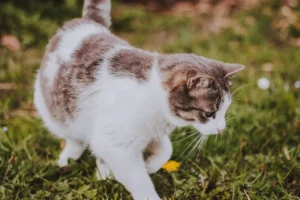Cats are mysterious creatures, known for their playful antics and independent nature. However, when they are sick, they often retreat and hide away from their owners. Have you ever wondered why cats hide when they are feeling unwell?
When cats are sick, they instinctively hide to protect themselves from potential predators in the wild. This behavior is a survival mechanism that allows them to rest and recover without drawing attention to their vulnerability. By understanding why cats hide when sick, we can better support our feline companions during times of illness.
Instinctual Behavior
When your furry feline friend starts to feel under the weather, their natural instinct kicks in, prompting them to hide. This behavior is deeply rooted in their evolutionary history. In the wild, showing weakness can make a cat vulnerable to predators, so hiding when sick is a survival mechanism. Even though your cat may not be in danger from predators in your cozy home, this instinctual behavior persists. By finding a secluded spot to hide, your cat is attempting to protect themselves from potential threats, even if they are simply feeling a bit under the weather. So, if you notice your cat hiding away, remember that it’s a primal instinct at work.
Stress Reduction
Feeling sick can be stressful for anyone, including our feline companions. Just like us, cats need a quiet and peaceful environment to rest and recover when they are unwell. Hiding provides them with a safe space where they can reduce stress and focus on recuperating. By finding a cozy nook or cranny to hide in, your cat can block out any external stimuli that may add to their anxiety. This stress reduction technique can help them conserve energy and heal more effectively. So, if you notice your cat retreating to a secluded spot, respect their need for solitude and allow them the space to rest and recuperate.
Additional Unique Insight: Providing your cat with a comfortable and familiar hiding spot, such as a cozy blanket or their favorite cardboard box, can further help alleviate their stress during illness.
Remember, understanding why your cat hides when sick can help you provide them with the support and care they need during these challenging times. By recognizing and respecting their instinctual behavior and need for stress reduction, you can help your furry friend feel more comfortable and supported as they recover.
Temperature Regulation
When cats hide when sick, it’s often a behavioural response to temperature regulation. Seeking out secluded spots allows them to better regulate their body temperature. By finding a cool, dark place, they can reduce fever symptoms or stay warm if they’re feeling chilled. This behaviour helps them feel more comfortable while they recover, which is essential for healing.
Sense of Security
Hiding also provides cats with a sense of security and comfort when they’re unwell. By finding a quiet spot, away from the hustle and bustle of daily life, cats can rest without feeling threatened. This reduces stress and anxiety, which can hinder recovery. Feeling safe in their hiding spot can reassure them as they battle their illness.
Additional Insight:
When cats hide when sick, it’s important to respect their need for privacy. Avoid trying to force them out of their hiding spot, as this can increase their stress levels. Instead, provide them with food, water, and a comfortable space nearby. Monitor their symptoms, and if they worsen, seek veterinary care. Allow your feline friend to heal in peace, and they will emerge when they’re ready.
Monitoring Symptoms
Cats hide when sick as a survival instinct, often concealing their illness to avoid appearing vulnerable. This can make it tricky for owners to monitor their furry friends’ health. To discreetly observe and assess your cat’s well-being, pay attention to subtle changes in behavior, such as decreased appetite, lethargy, hiding more than usual, or changes in litter box habits. Keep an eye out for any unusual physical symptoms like vomiting, diarrhea, or difficulty breathing. By being vigilant and attuned to your cat’s daily routines, you can catch potential health issues early on and seek prompt veterinary care.
Encouraging Engagement
When your cat is feeling under the weather, they may retreat to their favorite hiding spots, making it challenging to provide them with care and attention. To encourage your sick cat to come out of hiding and engage with you, create a cozy and comfortable space near their hiding spot with their favorite toys, blankets, and treats. Try engaging your cat in gentle play sessions, offering enticing food or treats, or providing soothing pets and cuddles to entice them out of their hiding place. Building trust and rapport with your sick feline companion can help strengthen your bond and make it easier to administer necessary care and medication.
Additional Unique Insight:
– Play soothing music: Sometimes, calming sounds like classical music or ambient noises can help relax your sick cat and encourage them to come out of hiding. Creating a calming environment with soft background music can help reduce stress and anxiety for your furry companion.
Seeking Veterinary Care
If your cat is hiding when sick, it’s crucial to seek veterinary care promptly. Cats are experts at masking illness, so if they are exhibiting signs of being unwell, such as hiding, it’s essential to get them checked out by a professional. Even if they seem to be feeling better after a day or two, it’s still wise to have them evaluated by a vet to rule out any underlying health issues. Remember, early detection and treatment can make a significant difference in your cat’s recovery.
Providing Comfort
Creating a comfortable and safe space for your sick cat to hide and recover is key to helping them feel better. Make sure the hiding spot is quiet, warm, and has easy access to food, water, and a litter box. Place their favorite blanket or bed in the hiding spot to provide familiar comfort. Additionally, try to spend some time with your cat in their hiding spot, offering gentle pets and soothing words to reassure them. Remember, being there for your cat during their time of need can make a world of difference in their recovery.
Key Tips for Providing Comfort: 1. Maintain a Quiet Environment: Minimize loud noises and disturbances to help your cat feel safe and secure. 2. Ensure Easy Access to Essentials: Place food, water, and a litter box near their hiding spot for convenience. 3. Offer Reassurance: Spending time with your cat, offering gentle pets and comforting words, can help alleviate their stress and anxiety. 4. Stay Patient: Allow your cat the time they need to heal and recover at their own pace.
Remember, creating a supportive and nurturing environment for your sick cat is essential for their well-being and recovery.
Cultivating Trust
Have you ever wondered why cats tend to hide when they’re feeling under the weather? The truth is, cats have an innate instinct to seek solitude and conceal any sign of weakness. When cats are sick, they often hide in secluded spots to protect themselves from potential predators in the wild.
Explore how providing gentle care and support can help build trust with your cat, encouraging them to come out of hiding and accept assistance.
By approaching your sick cat with patience and understanding, you can slowly cultivate trust and create a bond that will make them feel safe and cared for. Avoid forcing them out of their hiding spot; instead, create a calm and soothing environment for them to relax. Offer gentle pets and soothing words to let them know they are not alone.
Interesting Facts
Did you know that cats rely on their instincts to survive and thrive? When a cat feels unwell, they revert back to their primal instinct to hide and protect themselves. This behavior is deeply ingrained in their nature and should be respected during their time of sickness. Providing a quiet and secure environment can help your cat feel secure and aid in their recovery process.
Remember, patience and understanding are key when it comes to helping your feline friend feel better. By respecting their need for privacy and offering gentle care, you can support them in their time of need and ensure a swift recovery.
Interesting Facts
Curious to learn more about feline behavior when they’re feeling sick? Here are some interesting facts that shed light on why cats hide when they’re unwell:
- Survival Instinct: Cats’ natural survival instinct drives them to seek out hiding spots when they are sick. In the wild, showing any sign of weakness can make them vulnerable to predators, so hiding is a way for them to stay safe.
- Comfort Zone: Hiding provides cats with a sense of security and comfort during times of sickness. It allows them to rest undisturbed and helps reduce stress levels, promoting faster healing.
- Observant Nature: Cats are highly observant creatures, and they may hide when sick to avoid unwanted attention or interference. By giving them space and respecting their need for privacy, you are helping them feel safe and comfortable.
By understanding these behavioral patterns and respecting your cat’s instincts, you can create a nurturing environment that supports their recovery process. Remember, your furry companion relies on you for care and comfort, so be sure to provide the support they need during this challenging time.
Alex, a passionate animal lover, has experience in training and understanding animal behavior. As a proud pet parent to two dogs and three cats, he founded AnimalReport.net to share insights from animal experts and expand his knowledge of the animal kingdom.









